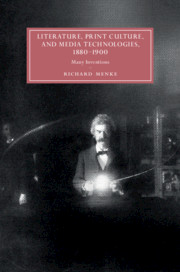Book contents
- Literature, Print Culture, and Media Technologies, 1880–1900
- Cambridge Studies in Nineteenth-Century Literature and Culture
- Literature, Print Culture, and Media Technologies, 1880–1900
- Copyright page
- Contents
- Figures
- Acknowledgments
- Introduction
- Chapter 1 A Message on All Channels
- Chapter 2 Fictions of the Victorian Telephone
- Chapter 3 New Media, New Journalism, New Grub Street
- Chapter 4 The Sinking of the Triple-Decker
- Chapter 5 Writers of Books
- Chapter 6 Words Fail
- Chapter 7 A Connecticut Yankee’s Media Wars
- After Words
- Bibliography
- Notes
- Index
- Cambridge Studies in Nineteenth-Century Literature and Culture
After Words
The End of the Book
Published online by Cambridge University Press: 30 September 2019
- Literature, Print Culture, and Media Technologies, 1880–1900
- Cambridge Studies in Nineteenth-Century Literature and Culture
- Literature, Print Culture, and Media Technologies, 1880–1900
- Copyright page
- Contents
- Figures
- Acknowledgments
- Introduction
- Chapter 1 A Message on All Channels
- Chapter 2 Fictions of the Victorian Telephone
- Chapter 3 New Media, New Journalism, New Grub Street
- Chapter 4 The Sinking of the Triple-Decker
- Chapter 5 Writers of Books
- Chapter 6 Words Fail
- Chapter 7 A Connecticut Yankee’s Media Wars
- After Words
- Bibliography
- Notes
- Index
- Cambridge Studies in Nineteenth-Century Literature and Culture
Summary
Even before the end of the nineteenth century, Octave Uzanne’s essay “The End of Books” (1894) portrayed the arrival of newer media as the fin of print culture. In this account, books are heavy and slow, newer media are light and liberating, and modern culture is an area of obsolescence and obliteration. A richer consideration of the varieties of print formats and the relationships between print and nonprint media might help us avoid the inclinations that come together in such accounts and their many modern successors. Uzanne’s vision of a post-print culture actually illuminates the late nineteenth century’s cultures of print. A contemporary image of Mark Twain in Nikola Tesla’s lab offers a more illuminating figure for the relationships between literature, print and nonprint media, and new technology.
- Type
- Chapter
- Information
- Literature, Print Culture, and Media Technologies, 1880–1900Many Inventions, pp. 187 - 195Publisher: Cambridge University PressPrint publication year: 2019

